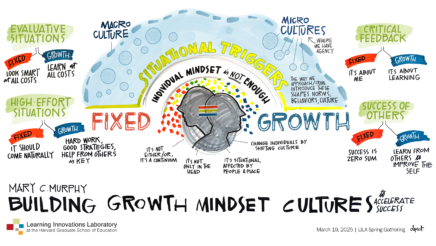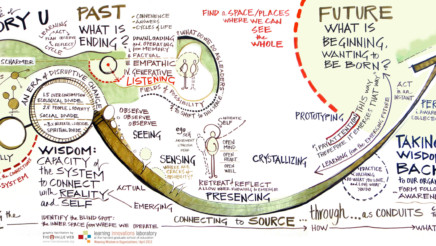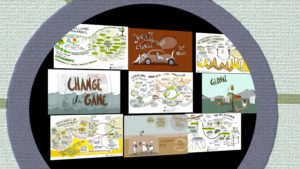Looking for content and documents from our Gatherings? Login
2025-2026 Theme Announced: Resilience in the Age of AI
LILA Theme 2025-2026: Resilience in the Age of AI We are living through a period of rapid and relentless transformation—geopolitically, socially, and technologically. Among the forces reshaping our world, generative AI stands out for its profound impact on how we work, learn, and lead. AI is rapidly evolving from a set of tools to a powerful set of systems that shape strategy, augment learning, and inform decision-making. These technologies offer new capacities for learning, collaboration, and prediction, while simultaneously redefining roles, relationships, and what it means to be human at work. In this context of mounting complexity, uncertainty, and fatigue, resilience is no longer just a personal trait—it is an essential strategy and practice, evolving alongside the intelligent systems that are rewiring our environments in real time. The challenge before us is not simply to withstand disruption, but to harness and adapt to it. Resilience is about the ability to prepare for (readiness), withstand and manage (response), and recover/grow from (resurgence) disruptions. All three are interconnected stages that together define and strengthen resilience in various contexts. This year, we will explore what fosters resilience at every level—individual, team, and organization—in a world where learning, adaptation, and decision-making are increasingly augmented by AI. This theme will explore questions such as What does it take to thrive when intelligent machines are part of our workflow? How can we design cultures and learning ecosystems that foster agility and intentionality? What new demands does this place on leadership as AI transforms our assumptions about expertise, efficiency, and collaboration? Together, we will draw from More »
 This year at LILA we have been exploring the theme of Navigating the Cs of Change—Members have been applying emerging insights to critical initiatives inside their organizations—rethinking leadership, designing future-ready systems, and shaping strategy for uncertain times. Specifically, we have looked at how organizations can transform conceptions, develop new capacities, and shift complex systems to thrive in a rapidly evolving world. Drawing on emerging research from social psychology, political science, ecology, and organizational studies, we have examined how to shift deeply held mindsets, foster the skills needed for adaptive leadership, and influence large-scale systems of work. From grappling with disinformation and shifting values, to building new habits and re-imagining work in the age of AI, this theme surfaced contemporary models of change that better align with today’s ecologies.
If you are a senior leader in your organization and would like to attend the LILA summit where you will Interact with other leaders, LILA members and guest faculty including keynote speaker and NYT-bestselling author Scott Sonenshein, get in touch with us and let us know what sparked your More »
This year at LILA we have been exploring the theme of Navigating the Cs of Change—Members have been applying emerging insights to critical initiatives inside their organizations—rethinking leadership, designing future-ready systems, and shaping strategy for uncertain times. Specifically, we have looked at how organizations can transform conceptions, develop new capacities, and shift complex systems to thrive in a rapidly evolving world. Drawing on emerging research from social psychology, political science, ecology, and organizational studies, we have examined how to shift deeply held mindsets, foster the skills needed for adaptive leadership, and influence large-scale systems of work. From grappling with disinformation and shifting values, to building new habits and re-imagining work in the age of AI, this theme surfaced contemporary models of change that better align with today’s ecologies.
If you are a senior leader in your organization and would like to attend the LILA summit where you will Interact with other leaders, LILA members and guest faculty including keynote speaker and NYT-bestselling author Scott Sonenshein, get in touch with us and let us know what sparked your More »
Building Growth Minded Cultures with Mary Murphy
 Mary introduced a shift from the traditional fixed vs. growth" mindset model (1.0) to a more dynamic Mindset 2.0 framework. This approach considers how organizational culture, leadership practices, and situational triggers influence whether individuals adopt a fixed or growth mindset. One key takeaway? Sustainable change happens at the micro-culture level—shaping local team dynamics rather than relying solely on individual mindset More »
Mary introduced a shift from the traditional fixed vs. growth" mindset model (1.0) to a more dynamic Mindset 2.0 framework. This approach considers how organizational culture, leadership practices, and situational triggers influence whether individuals adopt a fixed or growth mindset. One key takeaway? Sustainable change happens at the micro-culture level—shaping local team dynamics rather than relying solely on individual mindset More »
Competitive Learning Ecologies - Michael Kenney
 Michael Kenney Professor, University of Pittsburg conducts research into the adaptive strategies and learning processes of illicit organizations, particularly focusing on Colombian drug trafficking networks and terrorist groups. He examines how these entities modify their behaviors in response to experiences and new information, embedding this knowledge into their routines and procedures. This adaptability enables them to persist despite aggressive law enforcement More »
Michael Kenney Professor, University of Pittsburg conducts research into the adaptive strategies and learning processes of illicit organizations, particularly focusing on Colombian drug trafficking networks and terrorist groups. He examines how these entities modify their behaviors in response to experiences and new information, embedding this knowledge into their routines and procedures. This adaptability enables them to persist despite aggressive law enforcement More »
Theory U: A Framework for Leading Change Otto Scharmer
 Dr. Otter Scharmer introduced Theory U, a framework for transformation that guides individuals and organizations through a process of deep awareness and renewal to the LILA community More »
Dr. Otter Scharmer introduced Theory U, a framework for transformation that guides individuals and organizations through a process of deep awareness and renewal to the LILA community More »
Upcoming Gatherings
OCT 7-8 (Tues/Wed) Gathering – From Organisms to Organizations in the Age of AI
DEC 3-4 (Wed/Thurs) Gathering – Shaping Organizations for Resilience in the Age of AI
March 11-12 (Wed/Thurs) Gathering – Fostering Resilient Organizational Cultures for the Age of AI
JUNE 10-11 (Wed/Thurs) SUMMIT – Virtual
This Year’s Theme: Resilience in the Age of AI
We are living through a period of rapid and relentless transformation—geopolitically, socially, and technologically. Among the forces reshaping our world, generative AI stands out for its profound impact on how we work, learn, and lead. AI is rapidly evolving from a set of tools to a powerful set of systems that shape strategy, augment learning, and inform decision-making. These technologies offer new capacities for learning, collaboration, and prediction, while simultaneously redefining roles, relationships, and what it means to be human at work.
In this context of mounting complexity, uncertainty, and fatigue, resilience is no longer just a personal trait—it is an essential strategy and practice, evolving alongside the intelligent systems that are rewiring our environments in real time. The challenge before us is not simply to withstand disruption, but to harness and adapt to it. Resilience is about the ability to prepare for (readiness), withstand and manage (response), and recover/grow from (resurgence) disruptions. All three are interconnected stages that together define and strengthen resilience in various contexts.
This year, we will explore what fosters resilience at every level—individual, team, and organization—in a world where learning, adaptation, and decision-making are increasingly augmented by AI.
This theme will explore questions such as What does it take to thrive when intelligent machines are part of our workflow? How can we design cultures and learning ecosystems that foster agility and intentionality? What new demands does this place on leadership as AI transforms our assumptions about expertise, efficiency, and collaboration? Together, we will draw from two powerful lenses—the transformative potential of AI and the enduring need for resilience—to examine how organizations can bend without breaking, adapt without losing their core, and continue to grow while the ground shifts beneath them.
Join Us
Once a year, LILA offers membership to a limited number of senior leaders from global organizations. If you are interested in participating in LILA there are three levels of levels of engagement.

